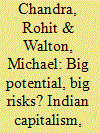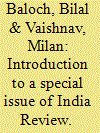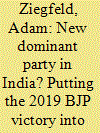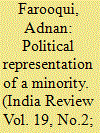|
|
|
Sort Order |
|
|
|
Items / Page
|
|
|
|
|
|
|
| Srl | Item |
| 1 |
ID:
171982


|
|
|
|
|
| Summary/Abstract |
This paper reviews India’s aggregate economic performance under the Modi/BJP/NDA administration through the prism of political economy. It argues that the inheritance of the UPA period was a combination of an unfolding “oligarchic capitalism” and a half-baked social democratic project. While the 2014 election victory was formally on a platform of “Minimum government, maximum governance” it always had deep ambiguities between a pro-business, pro-rules regime and an essentially nationalist project which subordinates commercial considerations. Some policy changes under this government, that we call Modi 1.0 – notably the GST reform and the Insolvency and Bankruptcy Code – constitute potentially substantive shifts to an efficiency-improving and rules-based approach. However, their effectiveness has been compromised by substantial delays, additional administrative burdens and increased uncertainty, not least over the actual implementation of the new rules. All this coincided with the legacy of a severe overhang in the financial system. This contributed to a chilling effect on private corporate investment. It has also gone alongside a continued major role of public sector banks and PSUs in the economy. The combination of an apparent increased concentration of mega-deals in some of the largest business houses, and continued, if anything rising, importance of state-managed subcontracting for infrastructure, has further contributed to the sense of an, at best, half-baked effort to reform India’s capitalism. A top-down economic nationalist stance, state-driven action, political resistance to reforms, and attacks on accountability institutions, will actually continue to threaten long-run development dynamics. The demonetization episode was only the most vivid example of a growth-dampening policy. At the beginning of the new government – Modi 2.0–these contradictions are intensifying. With the Covid-19 shock, the associated tensions will only become sharper.
|
|
|
|
|
|
|
|
|
|
|
|
|
|
|
|
| 2 |
ID:
171978


|
|
|
|
|
| Summary/Abstract |
This essay introduces a special issue of India Review on the consequences of the 2019 Indian general election for politics and public policy. The special issue assesses how four key policy and political domains are impacted by a second Narendra Modi-led BJP government: the party system, minority rights, the economy, and federalism.
|
|
|
|
|
|
|
|
|
|
|
|
|
|
|
|
| 3 |
ID:
171980


|
|
|
|
|
| Summary/Abstract |
The 2019 Indian national election delivered a convincing victory to the BJP and, along with it, prognostications of future BJP election wins. The BJP’s victory was certainly impressive, but does it portend a prolonged period of BJP rule at the national level? As of 2019, any predictions of the BJP’s long-term dominance are premature. The election revealed that the BJP possesses relatively few of the party-system advantages common to other dominant parties, including India’s former dominant party, Congress, during its period of dominance. Whereas a party is ideally situated to become dominant when it is large, enjoys a deep and broad base of support, and faces an opposition that is both fragmented and stigmatized, the BJP’s main advantage lies in its relatively deep support base in its political strongholds. On other dimensions, the BJP has far less in common with other dominant parties.
|
|
|
|
|
|
|
|
|
|
|
|
|
|
|
|
| 4 |
ID:
171979


|
|
|
|
|
| Summary/Abstract |
On August 5th 2019, the newly elected Bharatiya Janata Party (BJP) government in New Delhi moved the Indian Parliament to abrogate Article 370 and bifurcate the state of Jammu and Kashmir into two Union Territories. Months later, as the year came to a close, the Indian parliament passed a controversial amendment to India’s Citizenship Law. Several state governments came out in vocal opposition to the amendment, and some challenged the amendment in the Supreme Court. These events provided confirmation that the reelection of a majority BJP government has heralded far-reaching changes for India’s federal order, compounding shifts in the institutions and practice of federalism during Narendra Modi’s first term (2014–19). In this article, we assess the implications of the 2019 Lok Sabha elections for the future dynamics of federalism in the constitutional, administrative, and fiscal spheres under the second term Modi government.
|
|
|
|
|
|
|
|
|
|
|
|
|
|
|
|
| 5 |
ID:
171981


|
|
|
|
|
| Summary/Abstract |
Set against the political ascendance of the Hindu Nationalist BJP, this paper engages with the issue of political representation of Indian Muslims in the legislative arena. It gives an overview of broad trends and patterns in Muslim representation and seeks to draw out conclusions by focusing exclusively on the last two parliamentary elections. The paper argues while the Muslims have remained underrepresented in the legislative arena since Independence, the rise of BJP on a decidedly majoritarian political and social agenda makes it distinct from the earlier period. The attempt here is to flag out systemic shifts in Indian politics and what they mean for Indian Muslims. How different these shifts are for the Muslims compared to their past experience? And what are its possible implications?
|
|
|
|
|
|
|
|
|
|
|
|
|
|
|
|
|
|
|
|
|